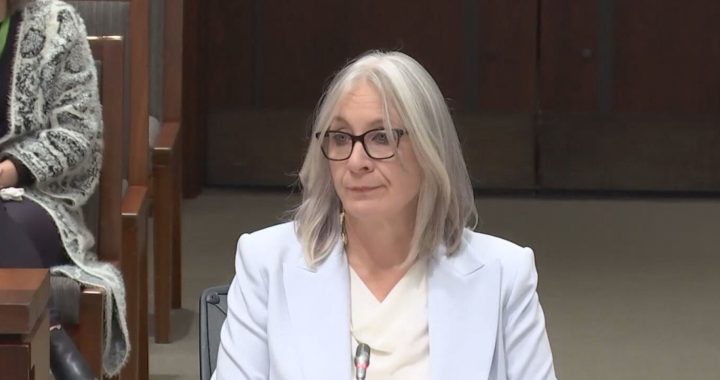Dogged by complaints over electoral financing irregularities, Penashue resigns cabinet post, seat
Former Innu leader Peter Penashue has resigned his cabinet post along with his Labrador seat Thursday saying donation irregularities to his federal election campaign have forced him to seek re-election in a byelection in the interest of accountability.
By Jorge Barrera
APTN National News
OTTAWA–Former Innu leader Peter Penashue resigned his cabinet post along with his Labrador seat Thursday saying donation irregularities to his federal election campaign forced him to seek re-election in the interest of accountability.
Penashue said in a statement he was resigning his Labrador seat over “ineligible donations” received by his election campaign.
The Conservative party said Penashue would be the party’s candidate in the upcoming byelection, which has yet to be called.
News of Penashue’s resignation also surprised his riding association and his own brother.
Penashue’s wife Mary Ann Penashue said she doesn’t discuss politics with her husband but believes him to be “committed” to helping the people of Labrador.
“He is the best man, he is the best husband and the best dad for my kids,” she said.
His brother Max Penashue found out about the resignation after he was contacted by a reporter and saw the news on television.
“It is a surprise, this is the first I heard of it,” he said.
Peter Penashue’s Conservative riding association was also caught off guard.
“I just heard the news,” said Tom Riggs, CEO of the riding association. “It is a pity; he was doing very well, we are very sad to hear it.”
Riggs said he knew Penashue was under investigation by Elections Canada. Elections Canada would neither confirm nor deny whether Penashue was under investigation.
Penashue was dogged by a number of issues surrounding donations to his federal campaign and had recently paid back the ineligible contributions, said Conservative party spokesman Fred DeLorey. Penashue paid back about $30,000.
Penashue blamed the donation errors on “inexperienced volunteer” Reginald Bowers, who was the campaign’s official agent. Bowers ended up being appointed to the Canada-Newfoundland and Labrador Offshore Petroleum (CNLOP) Board by the federal government. A spokesman for the board said Bowers submitted his resignation in a letter Thursday afternoon.
Penashue said Bowers’ replacement found “ineligible donations” had been accepted by Bowers.
“I must be accountable to the people who elected me,” said Penashue. “In the byelection, I will be asking the people of Labrador to re-elect me so that I can continue to deliver for Labrador.”
Penashue was facing a litany of election donation and spending complaints. Interim Liberal leader Bob Rae sent two letters to Elections Canada requesting an investigation.
Penashue beat Liberal incumbent Todd Russell by only 79 votes. Russell, who said he was thinking about challenging Penashue again, said Penashue’s apparent campaign financing irregularities likely put him over the top.
“I had my suspicions throughout the election,” said Russell. “There was an enormous amount of money being spent on the election (and) an enormous amount of money being put into charters and signage. There was no secret. We know the cost of this stuff.”
In one complaint, Rae asked the electoral authority to investigate five donations received by Penashue’s campaign that were listed under the same St. John’s postal code from senior employees with Newfoundland and Labrador-based Pennecon Ltd., which is involved in construction, energy and real estate.
The donations, which included three for $1,100 and two for $550, were also registered on May 4, 2011, two days after the last election.
Rae also asked Elections Canada to probe a $25,000 loan Penashue’s campaign received from Innu Development Limited Partnership (IDLP) which was original registered as interest free. This contravened election laws which require loans to follow market rates. Rae also asked the elections watchdog to investigate a decision by an airline, partly owned by IDLP, to write off all but $7,000 of $18,163 in travel costs racked up by Penashue and his family.
Penashue was also dogged by criticisms around his family and business links to the Muskrat Falls project, which received a loan guarantee from the federal government.
In late November, Penashue asked the federal Conflict of Interest and Ethics commissioner to re-examine his file or any potential conflicts arising from his former role as a Labrador Innu treaty negotiator and an agreement guaranteeing Innu businesses contracts from the multi-billion dollar hydroelectric development project.
His financial disclosure filing was also updated on Dec. 20, 2012. The updated filing no longer lists Penashue as receiving employment income from Penashue Group Inc., a company he co-owns with his wife. He is also no longer receiving income from the Innu Nation, according to the filing.
The updated filing also shows that Penashue holds a business loan jointly with Bob Engram. In the previous filing, Engram was not named but identified as a third-party. Engram appears to own Inglutek Computers. In his filing, Penashue lists himself as a director for Iglutek.
There is no straight line between Penashue and the Muskrat Falls project, but the winding path begins with his filings and flows through a company headed by his wife and a separate firm headed by two senior executives with Newfoundland and Labrador firm Pennacon.
Pennacon is in a business partnership with Penashue’s brother Max Penashue and their firm, Liannu LLP, is actively pursuing and landing contracts from the Muskrat Falls project.
Penashue was a lead negotiator in the New Dawn agreement between the Innu Nation in Labrador, Ottawa and the Newfoundland and Labrador government. The agreement was signed while Penashue was in cabinet and it was a crucial step in pushing the Lower Churchill project forward, which includes the $7.4 billion Muskrat Falls development.
The New Dawn agreement included an impact benefit agreement giving the Innu millions of dollars in royalties and guaranteed contracts for their businesses from the Lower Churchill project. Construction of the Muskrat Falls dam is the first phase of the project.
The agreement also included an agreement-in-principle on self-government and compensation for loss of hunting grounds due to flooding from the 1969 Upper Churchill River hydroelectric project.
@JorgeBarrera









